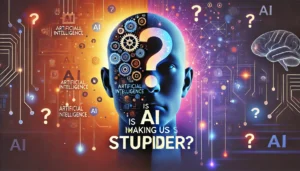Critical thinking is a vital skill in today’s world, but how does generative AI impact our ability to think critically? A recent study explored this question, revealing fascinating insights into how people perceive AI’s influence on their thinking processes. Let’s break down the findings and what they mean for you.
What Is Critical Thinking?
Critical thinking is about thinking clearly, logically, and effectively. It involves evaluating our own thought processes against standards like precision, clarity, accuracy, and relevance. However, our thinking can be influenced by personal biases, existing beliefs, and incomplete mental models.
The study used a framework developed by Benjamin Bloom in 1956 to define critical thinking. Bloom’s framework organizes thinking skills into levels, starting with basic skills like remembering information and moving up to advanced skills like analyzing and evaluating information. While this framework is simple and easy to use, it has been criticized for assuming that higher-level thinking skills depend on mastering lower-level ones. In reality, thinking doesn’t always follow this hierarchy.
The Role of Generative AI in Shaping Critical Thinking
Generative AI tools, like ChatGPT, often follow a structure similar to Bloom’s framework when producing outputs. This raises an important question: Is generative AI shaping how people think about critical thinking?

One key issue is that Bloom’s framework misses a crucial aspect of critical thinking: the desire to find the truth. A critical thinker not only uses thinking skills but uses them well because they care about accuracy and truth. AI systems, on the other hand, don’t have this intrinsic motivation.
Key Findings from the Study
The study surveyed 319 professionals, including healthcare workers, educators, and engineers, who used generative AI to complete 936 tasks. Here’s what the researchers discovered:
1. Critical Thinking Happens During Oversight, Not Execution
Participants reported using critical thinking less while completing tasks with AI and more when reviewing and editing AI-generated outputs. In high-stakes environments, the need to produce high-quality work and avoid mistakes motivated users to think critically during the review stage.
2. Confidence in AI Reduces Critical Thinking
The study found that people who trusted AI more tended to think less critically. On the other hand, those who trusted their own abilities displayed stronger critical thinking skills. This suggests that generative AI doesn’t harm critical thinking—as long as the user already has strong thinking skills.
3. Efficiency Outweighs Oversight Effort
Participants felt that the time saved by using AI outweighed the effort required to review its outputs. While critical thinking was important during oversight, the overall efficiency gains made AI a valuable tool.
Limitations of the Study
The study relied heavily on self-reported data, which can be biased or misinterpreted. Additionally, participants defined critical thinking in terms of task completion—such as setting clear goals and meeting specific standards—rather than broader thinking skills. This raises the question: Was the study really measuring critical thinking, or just task efficiency?
How to Become a Better Critical Thinker
The study highlights the importance of critical thinking when using generative AI. Here are some steps you can take to improve your critical thinking skills:
1. Question Assumptions
Challenge unstated assumptions behind claims and ideas. Ask yourself: What evidence supports this? Are there alternative explanations?
2. Evaluate Diverse Perspectives
Consider different viewpoints and weigh their merits. This helps you avoid biases and think more objectively.
3. Practice Systematic Reasoning
Use structured methods to analyze information and solve problems. Collaborate with others to test your ideas and refine your thinking.
4. Use AI as a Tool, Not a Crutch
Generative AI can be a powerful tool, but it shouldn’t replace your critical thinking. Use it to challenge yourself and enhance your reasoning, not to do the thinking for you.
Can Generative AI Improve Critical Thinking?
Just as chalk and chalkboards helped us get better at math, generative AI might help us improve our critical thinking—if we use it carefully. By challenging us and providing new perspectives, AI could augment our thinking skills. However, the responsibility lies with us to ensure we’re using AI thoughtfully and not letting it do the thinking for us.
Final Thoughts
Generative AI is here to stay, and its impact on critical thinking depends on how we use it. By becoming a critical thinker first, you can harness the power of AI without compromising your ability to think clearly and independently. Remember, the goal isn’t just to complete tasks efficiently—it’s to think well and make informed decisions.
What are your thoughts on generative AI and critical thinking? Share your opinions in the comments below!
For more articles like this Explore.
